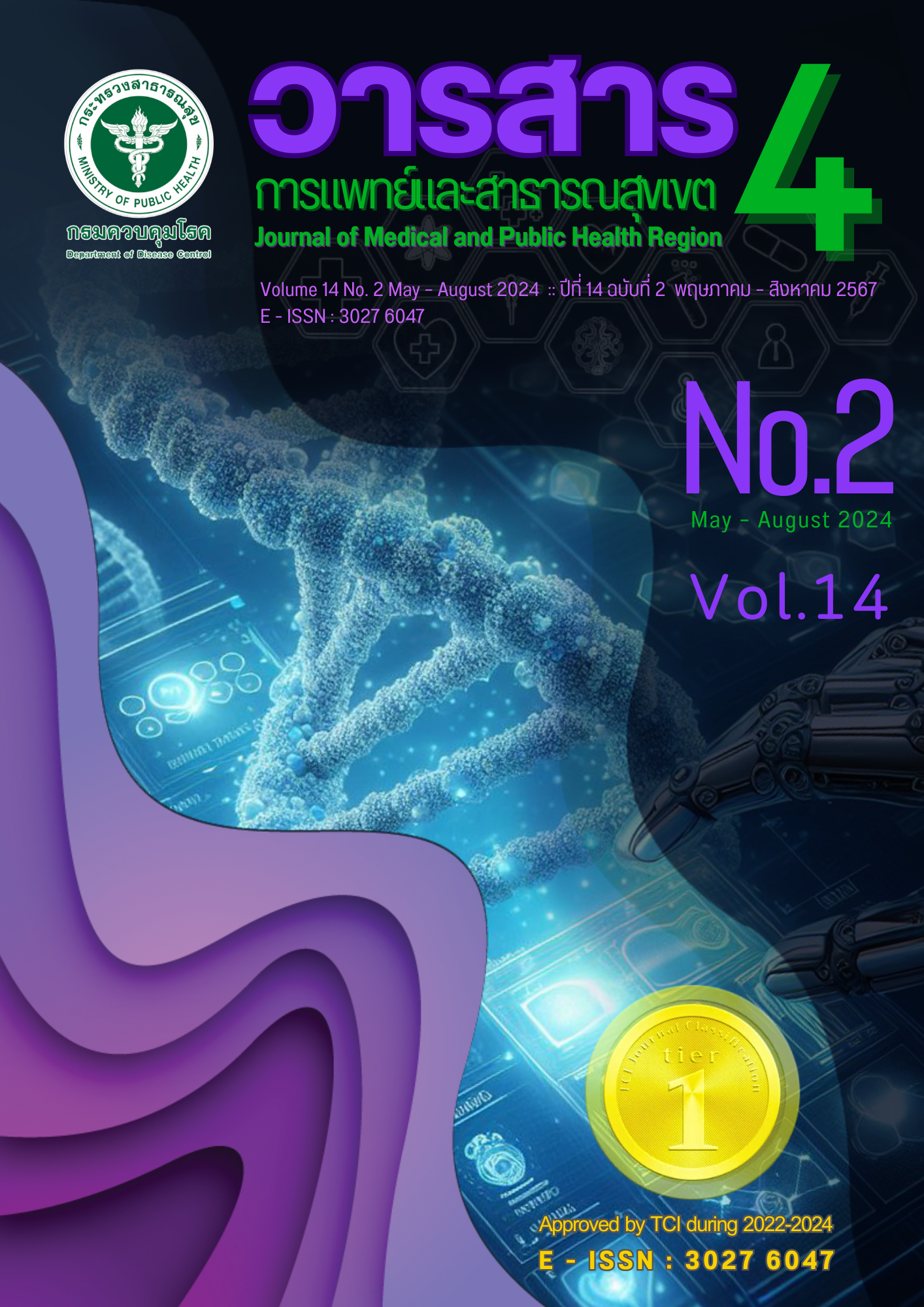The data management study of blood glucose control of diabetic patients in Hospital Region 4 : Ayutthaya province
Main Article Content
Abstract
Patients with good blood sugar control (target 40%) had 27.10% with the least control in fiscal year 2019 in the 4th health region for Phra Nakhon Si Ayutthaya Province. This study aims to study the process, coverage, completeness, problems, obstacles, and solutions for registering diabetic patients who can control their blood sugar levels. The qualitative mixed-methods study format is to collect data by discussing group processes. A semi-structured interview was used. Personnel working in chronic non-communicable disease clinics of the Tharuea Hospital Health Service Network Quantitative data were collected using a diabetic patient record form. The results of the study found that when diagnosed as a diabetic patient, they would follow up with a blood test to check the blood sugar level with FBS. If the blood sugar level with FBS was 145 mg/dl, they would follow up next time if FBS was 145 mg/dl three or more times in a row. underwent treatment with behavior modification. And monitor blood sugar levels every 3 months. The doctor will send for an HbA1c test if it doesn't improve. Registration coverage was found to be 39.28 percent, with 88.60 percent completeness. Patients who received follow-up checks were able to control their blood sugar levels. 7.84% Data problems found that medical personnel responsible for entering ICD-10 codes did not know the codes for tracking. Therefore, it is necessary to decide to code as a diabetic patient. As a result, the data contains more diabetic patients than exists. and the diagnosis cannot be removed. Therefore, information system management should review goals and put them to good use using a participatory development process, namely policy formulation. Develop personnel potential. Provide opportunities for personnel to participate and promote the use of technology in recording diabetic patient information.
Article Details

This work is licensed under a Creative Commons Attribution-NonCommercial-NoDerivatives 4.0 International License.
References
Health Data Center. Summary of sick report 2020. Bangkok: Strategy and Planning Division. from: https://hdcservice.moph.go.th/hdc/main/index.php
Region 4th Health Provider Office. Report on the performance of the Region 4th Health Provider Office for the fiscal year 2021. Saraburi: Region 4th Health Provider Office. (in Thai).
Srirattanabun J, Wichanuwat S. The completeness and accuracy of the 52-file standardized dataset for use as a resource for value-oriented health care indicators in the diabetes population. Journal of Public Health Systems Research 2021; 15(4): 396-406. (in Thai).
Saithong W, Waikayee P. Training document “43 files of data and linking standard reporting systems in Health Data Center (HDC)” by the HDC Center for Information Technology team Ministry of Public Health. From http://hdc.moph.go.th/download/ document/training/visualization2018/was an (255843_Data_Analytic.pdf 8-378. At 20 Dec. 2018. (in Thai).
Naruekon N. Development of a service system to support the care of patients infected with Coronavirus 2019 (COVID-19) Busrakham field Hospital Ministry of public Health. Academic Journal of the Department of Health Service Support 2020; 18(3): 37-46. (in Thai).
Nitiyanan W. Diabetes. Thai Youth Encyclopedia by His Majesty the King. 2010; 35: 242-69. (in Thai).
Thong-on T, Kleangsin W. Development of a paperless system in Pa Payom Hospital. Phatthalung: Medical Record and Statistics, Health Insurance Group Pa Phayom Hospital. 2017. (in Thai).
Phuwasanti S, Suwanwong Y. A study of opportunities to develop health information technology systems to support medical and public health operations in Saraburi Province. Journal of Urban Disease Prevention and Control Institute 2020; 6(1): 125-51. (in Thai).
Saejia A. To measure the performance of the Thammasat University Library objective key results (OKRs). Thammasat University. 2018. (in Thai).
Vanmontri S, Runkkul A. Problem solving approaches from applying the concept of objective and outcomes to organizational management: a case study of Khon Kaen University. Journal of Modern Learning Development 2021; 7(1): 255-66. (in Thai).
Tor-Udom P. Transferring strategies for success with OKRs. Thammasat chaloemprakiat Hospital. Thammasat University. 2020. (in Thai).


